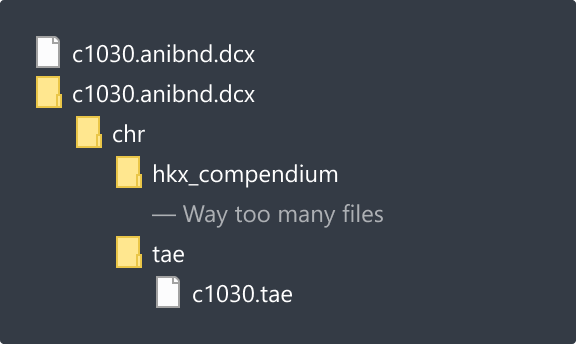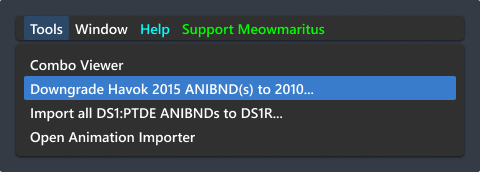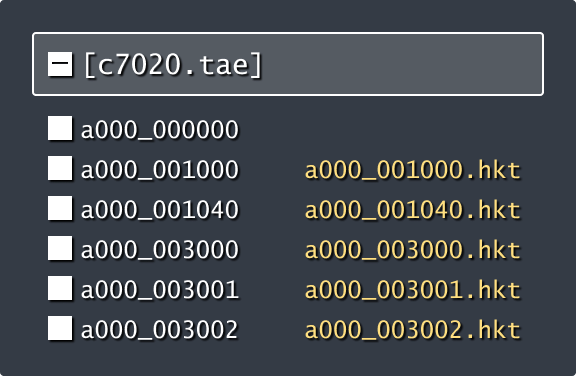Animations - SekiroResurrection/modding-wiki GitHub Wiki
Table of contents
- Setup
- Getting started
- Opening and viewing animations
- Downgrading character animations
- ⬇️ Download all — downgraded by sauce
- Downgrading main character animations
- View all PC Animations
- Downgrading character animations
- TAEs
Setup
In order to access the animation files of Sekiro, two requirements must be met.
- Unpack the Sekiro
.exewith UXM. - Have DSAnimStudio installed.
➡ Download UXM and DSAnimStudio in the Tools page.
Getting started
Once Sekiro has been unpacked, your Sekiro game folder should contain several other folders, like chr, cutscene, event, font, and more.
All the animation files for Sekiro are found in the chr folder.

We only care about the first file.
Opening and viewing animations
You can identify which character's animations you'll be viewing by checking it's ID in Characters.
When opening Sekiro animations - from any character - you are likely to find them T-posing instead.
This is because the Havok version used in Sekiro differs from past Souls games, thus, it cannot be read properly from the get-go, and must be downgraded to show up properly.
Downgrading character animations
To view Sekiro animatons, their file must be downgraded using DSAnimStudio's built-in downgrading function.
Open any character file you want and select the downgrading option in Tools.

⚠ Important: Downgrading will create a new file, with the filetype .2010. This file should be ignored.
It will make it so the original file is now fully playable inside DSAnimStudio. Edit the original instead.
Downgrading main character animations
⚠ Important: To view Sekiro's — the main character — animations, you will need to downgrade every .anibnd file from c0000 to c0100. That's a total of 56 files.
➡ To view all Sekiro animation IDs and what they are, visit the PC Animations page.
TAEs
Each character .anibnd file contains a .TAE file, which has animation entries, each with a timeline of events within them.

⚠ Important: While it's possible to create new animation entries, they cannot be invoked by modding due to Havok version support restrictions.
Blocks
The vast majority of TAE entries contain a timeline of events. These can be anything from camera changes, to SpEffects to hitboxes, and more.

Blocks can be stretched or compressed, repositioned, added or removed, and some can have their attributes edited within DSAnimStudio.
There are too many blocks to list, but some of the most important ones - and the ones you'll often see are:
| Block name | What it does |
|---|---|
InvokeAttackBehavior[1] |
Defines hitboxes. |
InvokeBulletBehavior[2] |
Invokes a bullet, which may be an effect or any sort of projectile. |
AddSpEffect[67] |
Adds a SpEffect whose duration may or may not rely on how long the block is. |
Blend[16] |
Found at the start of animations. Blends the ending frame of an animation with the start of another animation. |
SetTurnSpeed[224] |
Sets the turn rate for the enemy while the block is active. |
SetMovementMultiplier[760] |
Self-explanatory, although much of it is unknown. 01xC4 defines the forward movement multiplier. |
SpawnOneShotFFX[96] |
Spawns a visual effect while the block is active. |